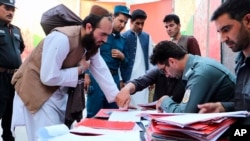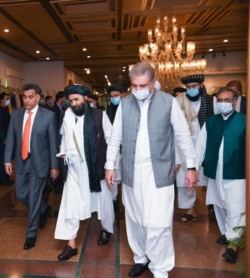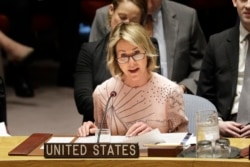Authorities in Afghanistan said Thursday the last group of about 400 Taliban prisoners has been released, concluding a protracted swap between the two adversaries and finally setting the stage for Afghan rivals to launch peace talks brokered by the United States.
An Afghan government spokesman, Javid Faisal, announced the conclusion of the prisoner exchange, noting the fate of a small group of inmates was still to be determined. He explained that some Western countries have opposed the release of the men for their involvement in deadly attacks against foreign citizens.
“Diplomatic efforts are ongoing. We expect direct talks to start promptly,” Faisal said.
Meanwhile, officials in Kabul said a national team of peace negotiators, including politicians, civil society activists and government officials, will fly to Doha, Qatar, to begin the talks with the Taliban. Officials say women will be among the negotiators.
The insurgent group’s negotiating team is based in the capital city of the Gulf state. It was not immediately known when the dialogue, known as the intra-Afghan negotiations, will begin, though some reports said it could be as soon as Saturday.
Taliban sources also have confirmed the release of all their 5,000 prisoners from Afghan jails in return for more than 1,000 government security forces the insurgent group held captive. They have acknowledged, however, that a group of seven Taliban prisoners would be transferred to Doha, where they would be kept under supervision of the host government.
Taliban spokespersons did not respond to VOA requests for comment on the latest developments.
U.S.-Taliban deal
The peace talks stem from a landmark agreement between the United States and the Taliban that aims to end the nearly two-decade Afghan war, America’s longest.
The deal, sealed Feb. 29 in Doha, binds the Afghan government and the Taliban to negotiate a permanent cease-fire and a political settlement to govern the war-shattered country after the withdrawal of all American and allied troops.
President Donald Trump’s administration has reduced the number of U.S. forces from about 13,000 to 8,600 since signing the pact and officials say the “conditions-based” drawdown will see all American troops out of the Afghanistan by mid-2021.
In return, the Taliban has committed to fight terrorism and politically reconcile with other Afghan factions to end decades of hostilities.
Pakistan’s role
Leaders in neighboring Pakistan, which is credited with playing a crucial role in facilitating the U.S.-Taliban talks, have warned the proposed intra-Afghan negotiations could be a long and frustrating process.
“This 19 years of war in Afghanistan has created such divisions in the society, there’s been so much bloodshed that for anyone to believe in this utopia that suddenly they will all get together and there will be peace, I am afraid it’s a very complicated situation,” Pakistani Prime Minister Imran Khan told Al Jazeera TV on Thursday.
“The longer this war went, the more the rivalries, the hatred, the divisions and the more difficult it is to actually sit down together with all the antagonists. But this is the nearest we have got to peace in Afghanistan and a political solution,” Khan emphasized.
“This is a miracle that it is actually happening. We pray that this happens,” he added.
Allegations that Pakistan sheltered and covertly supported the Taliban insurgency have long strained Islamabad’s turbulent relations with Kabul and Washington.
Khan said his government has used whatever influence it had with the insurgents to push them to the table for peace talks. The effort, he insisted, has led to Pakistan’s improved relationship with the U.S.
“We probably have the best relationship with the United States right now because we are partners in peace in Afghanistan. We did not have such a good relationship a few years back,” said the Pakistani prime minister.
U.N. support
At the U.N. Security Council on Thursday, the U.N.’s top envoy to Afghanistan welcomed the prospect of intra-Afghan talks, saying it is a “historic moment,” but one that comes with many challenges. Deborah Lyons noted that violence continues to kill and injure hundreds every week and she urged a humanitarian cease-fire to accompany negotiations.
“The last few weeks have seen near-record numbers of security incidents, including egregious attacks by spoilers targeting civilians involved in the peace process,” Lyons said.
She noted that a pledging conference planned for November will take place in parallel with the intra-Afghan negotiations.
“Each process must reinforce the other,” she said. “Combined, these two processes will set the course for Afghanistan’s future along with the political will and the incredible resilience of the Afghan people.”
The United Nations and many voices in the international community have stressed the need for women to be involved in the peace process. Only four of the 21 negotiators on the Afghan government’s team are women and, unsurprisingly, the Taliban has none.
U.S. Ambassador to the United Nations Kelly Craft said women must be allowed to meaningfully participate in the peace process and have their freedoms protected.
“The United States has spoken clearly on what will happen if these rights aren’t maintained,” she said. “No current, nor future Afghan government should count on international donor support if that government restricts or represses the human rights and fundamental freedoms of women and girls.”
United Nations correspondent Margaret Besheer contributed to this report.







